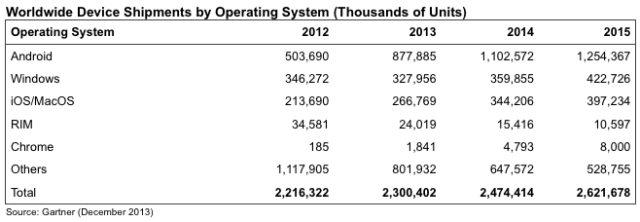

As the worlds of communication and technology increasingly become mobile-first, the traditional desktop PC continues to go the way of the dodo bird. The analysts at Gartner are today publishing their annual devices forecast, and they project 2014 to be another banner year for mobile — and its biggest player, Android. There will be 2.5 billion PCs, tablets and mobile handsets shipped this year. Of those, 1.9 billion will be mobile handsets, and 1.1 billion devices will be Android-based.
That represents an overall rise of 7.6% over 2013, with all of the growth coming from mobile devices like handsets, tablets and “ultramobiles” (Gartner’s preferred term for those devices like Samsung’s Galaxy Note that are not-quite-tablets). Desktop and notebook PCs will decline to 278 million units, Gartner says. Overall this is a big improvement over 2013, a year that saw only 3.8% growth.

To give some context of Android’s rise — and of what role “mobile” plays in the device landscape — Google’s OS in 2014 will account for nearly 45% of all device shipments. In 2013, it was 38%. In 2015, Gartner projects it will be nearly 48%.
The same is being played out in terms of the installed base. Among existing device owners, Android clocked 1.9 billion devices in use in 2014, while Apple had 682 million across both iOS and Mac, according to principal analyst Annette Zimmerman. This, of course, is crucial for those who are hoping to lock consumers into ecosystems and brands, and to court repeat purchases in an ever-more saturated market.
Gartner does not break out specific manufacturers, but Ranjit Atwal, a research director at Gartner, confirmed to me what you may have already guessed: just as Android dominates mobile, Samsung dominates Android.
That could, he believes, lead the company closer to developing its own, customized operating system, similar to what Amazon has done with its Fire OS. (Indeed, Samsung’s recent developer’s conference, with new SDKs for its different range of devices, seems to point in this direction, too.) The thinking here is that Samsung will want to control its own destiny better than it can do as a Google partner. That will include creating its own app experience, and its own ways of monetising that experience.
Further down the league table, Apple is getting closer to Windows in overall shipments, although Microsoft’s OS (which includes both Windows and Windows Phone) edges it out with 360 million units to Apple’s 344 million devices, or 14% of all devices shipped.)

In terms of geography, Atwal tells me that China is continuing to set the pace for what is being bought and for how much. He says that while smartphones continue to be sold in vast quantities, as the high end gets ever more saturated we’re seeing an ever-greater emphasis on low-priced devices for later adopters. That is being played out in other less mature markets. By 2017, over 75% of Android’s volumes will come from emerging markets, says Gartner. Among earlier adopters in China, Atwal says Gartner is seeing a rise of tablet sales.
What Gartner is not putting into its forecast, in a way, is possibly more interesting than what is there. There are no wearables or cars, or smart TVs — three other device categories that are becoming increasingly “smart” and being built on the same kinds of platforms that dominate more established categories like handsets, PCs and tablets. As a mark of their rising importance, Atwal tells me that these categories are likely to become part of Gartner’s overall device mix later this year.
Read more : Gartner: 2.5B PCs, Tablets And Mobiles Will Be Shipped In 2014, 1.1B Of Them On Android


0 Responses
Stay in touch with the conversation, subscribe to the RSS feed for comments on this post.